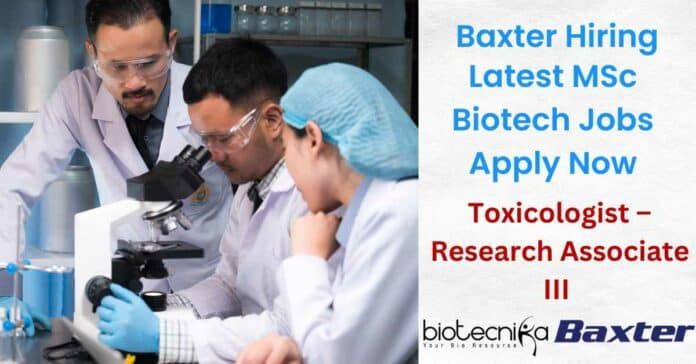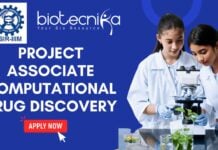Baxter Research Associate Toxicologist Job For MSc Biotech, Apply Online
Baxter Research Associate Toxicologist Job For MSc Biotech, Apply Online. Research Associate III at Baxter-MSc Biotechnology Candidates Eligible. Toxicologist Research Associate III at Baxter. Interested candidates can check the details given below and apply online.
Job Title: Toxicologist-Research Associate III (PreClinical, Kidney Care RnD)
Job ID: JR – 099279
Job Location: Whitefield, Bangalore
Job Category: Research and Development
Shift: General
This is where you save and sustain lives
At Baxter, we are deeply connected by our mission. No matter your role at Baxter, your work makes a positive impact on people around the world. You’ll feel a sense of purpose throughout the organization, as we know our work improves outcomes for millions of patients. Baxter’s products and therapies are found in almost every hospital worldwide, in clinics and in the home. For over 85 years, we have pioneered significant medical innovations that transform healthcare. Together, we create a place where we are happy, successful and inspire each other. This is where you can do your best work. Join us at the intersection of saving and sustaining lives—where your purpose accelerates our mission.
Summary:
Scientist/Researcher in this role will have expertise
in toxicology and medical device biocompatibility testing including development of toxicity study design and biocompatibility testing design for drug/drug packaging system/medical device development, monitoring, and development of toxicological risk assessments. The successful candidate will have hands-on experience in hazard evaluation of chemicals used in manufacturing and will participate preparing reports for external regulatory bodies in accordance with ICH and ISO10993-17.Job Responsibilities:
- Design, plan, monitor various GLP toxicity studies, biocompatibility studies, risk/safety assessment (risk assessment and qualification of impurities, leachables, extractables, residual solvents and excipients) and safety data sheet related activity with some supervisions from direct manager and senior members of the organization.
- Author toxicological risk assessment reports and review or concur toxicology assessment reports as subject matter expert (SME) in accordance with ICH and ISO10993-17.
- Work independently on hazard evaluation of chemical and pesticide used in manufacturing.
- Participate as preclinical/toxicology representative and contribute in core technical team meetings as SME and provide inputs and lead task to be executed for completion of projects with effective collaboration and deliverables.
- Maintain and reciprocate current knowledge of relevant regulatory requirements related totoxicology, product development, design and safety as per Baxter’s business needs with team members and cross functional teams.
- Participate in change control management and impact assessment. Propose options, work closely with stakeholders and develop action plan for problem-solving, product and process improvement.
- Prepare and/or review nonclinical eCTD and PBRER sections and Safety data sheets (SDS)
- Utilize in silico tools (e.g. Lhasa Derek and Sarah Nexus software) to assess toxicological endpoints.
Qualifications:
- The position requires relevant technical knowledge in toxicology and biocompatibility testing.
- Demonstrated ability to understand and apply global regulatory guidelines including OECD and FDA GLP, ICH Q3 guidelines, ISO 10993.
- Excellent oral and written communication in English language.
- Utilize a logical, methodical approach when problem solving, developing solutions and making recommendations.
- Ability to work independently and prioritize assignments to meet project schedules.
- Ability to design experiments, monitor toxicology studies, interpret the results and draw meaningful conclusions from the data and prepare reports for external regulatory bodies
Education and/or Experience:
- Master of Medical Sciences/Veterinary/Biotechnology (or relevant) with 8 years of relevant work experience, or PhD with relevant experience during thesis (&/or Post-doc) e.g., in in vitro and in vivo PreClinical pharmacological (preferably sterile injectable/parenteral formulations) and toxicological studies and risk assessment of chemicals, biocompatibility testing of medical devices, drug packaging system.
Skills
- Demonstrated ability in clear and effective communication (written, oral) and presentation skills to global stakeholders, Fluency in English.
- Can effectively communicate with internal and external customers.
- Solid computer skills: email, good documentation practice, and collaboration tools: e.g., Zoom, Teams, Microsoft Office products, etc.
- Demonstrated ability to work in a matrix environment with multiple stakeholders
- Demonstrates flexibility and the ability to shift gears between projects comfortably.
- Proven ability to deliver results by owning & being accountable for budget, timeline, and product/project deliverables
Reasonable Accommodations
Baxter is committed to working with and providing reasonable accommodations to individuals with disabilities. If, because of a medical condition or disability, you need a reasonable accommodation for any part of the application or interview process, please send an e-mail to [email protected] and let us know the nature of your request along with your contact information.
Recruitment Fraud Notice
Baxter has discovered incidents of employment scams, where fraudulent parties pose as Baxter employees, recruiters, or other agents, and engage with online job seekers in an attempt to steal personal and/or financial information. To learn how you can protect yourself, review our Recruitment Fraud Notice.
Here are a few interview questions with answers for the job role of Research Associate III at Baxter:
1.Can you describe your experience in designing and conducting GLP toxicity studies and biocompatibility testing for medical devices? How do you ensure compliance with global regulatory guidelines? Answer: In my previous role, I have been extensively involved in designing and overseeing GLP toxicity studies and biocompatibility testing for medical devices. I ensure compliance with global regulatory guidelines, such as OECD and FDA GLP, ICH Q3 guidelines, and ISO 10993, by closely following the established protocols and procedures. Additionally, I maintain up-to-date knowledge of regulatory requirements and participate in relevant workshops and training sessions. This helps me to apply the latest guidelines and standards in our testing processes, ensuring the safety and efficacy of our products.
2.As a toxicology subject matter expert, how do you approach authoring toxicological risk assessment reports? Can you give an example of a challenging assessment you worked on? Answer: When authoring toxicological risk assessment reports, I take a systematic approach, starting with a comprehensive literature review and data collection. I analyze the toxicity data, identify potential hazards, and assess the risks associated with our products. To ensure accuracy, I collaborate with cross-functional teams, including regulatory affairs and R&D, to gather all necessary information. A challenging assessment I worked on involved a new chemical compound in our drug formulation. The available toxicological data was limited, and there were concerns about its potential impact on certain organs. To address this, I employed in silico tools (e.g., Lhasa Derek and Sarah Nexus software) to assess toxicological endpoints and conducted in-depth discussions with our toxicology team. The collaborative effort led to a comprehensive risk assessment report, enabling our company to make informed decisions about the compound’s development.
3.How do you approach change control management and impact assessment? Can you share an example of a situation where you successfully managed change in a preclinical project? Answer: Change control management is a critical aspect of ensuring product safety and compliance. When faced with a change in a preclinical project, I begin by thoroughly assessing its potential impact on the overall safety and efficacy of the product. I work closely with stakeholders, including R&D, regulatory, and quality teams, to understand the implications and devise an action plan. One example of successful change management involved a modification in the formulation of a medical device component. I led the impact assessment, conducted additional biocompatibility testing to validate the safety of the new material, and prepared a detailed report for regulatory submission. By proactively addressing the change and ensuring its safety, we were able to maintain project timelines and deliver a safe product to the market.
4.How do you ensure effective communication and collaboration within a matrix environment, especially when working on complex projects with multiple stakeholders? Answer: Effective communication and collaboration are essential in a matrix environment. To ensure smooth interactions, I believe in maintaining open and transparent communication channels with all stakeholders. Regular meetings, both virtual and in-person, help to align everyone’s understanding of project objectives and milestones.When working on complex projects with multiple stakeholders, I take the initiative to establish clear roles and responsibilities. By defining each team member’s contributions, we can ensure a coordinated effort. I also value feedback from team members, which helps improve our collaboration over time.
Editor’s Note: Baxter Research Associate Toxicologist Job For MSc Biotech, Apply Online. Please ensure you are subscribed to the Biotecnika Times Newsletter and our YouTube channel to be notified of the latest industry news. Follow us on social media like Twitter, Telegram, Facebook






























